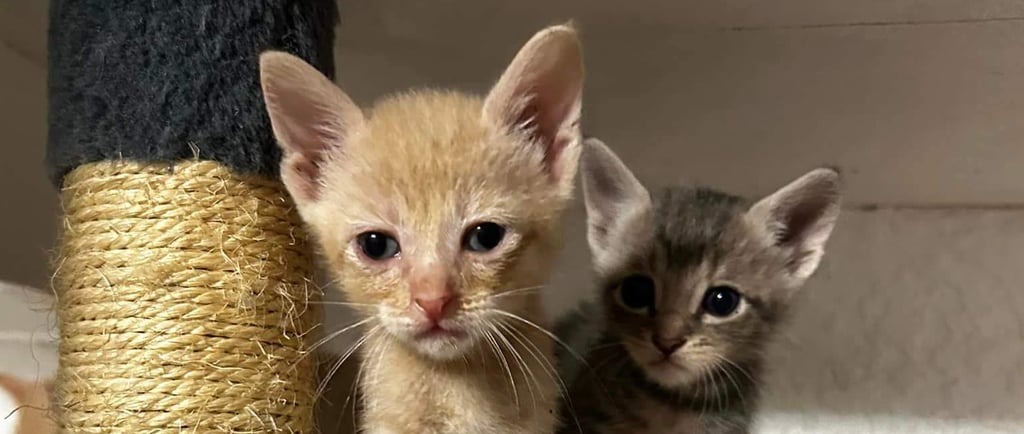What should I do if my kitten is not eating?
If your kitten is refusing to eat, it's essential to address this promptly to prevent them from becoming weak or dehydrated. Our latest blog post provides a comprehensive guide on how to encourage your kitten to eat and maintain their health. We cover various steps such as assessing potential stressors, creating a calm feeding environment, and offering different types of food to entice their appetite. Additionally, we discuss the importance of monitoring for signs of illness and when to consult a veterinarian. By following these guidelines, you can help ensure your kitten stays healthy and happy.
BLOG POSTS
5/8/20242 min read


If your kitten is not eating, it's important to address the situation promptly, as young kittens can quickly become weak and dehydrated. Here are steps you can take to encourage your kitten to eat and ensure their health:
1. Assess the Situation
Check for Stressors: Moving to a new home, changes in environment, or new people and pets can stress a kitten, leading to a loss of appetite.
Inspect Food: Ensure the food is fresh and suitable for kittens. Some kittens may prefer wet food over dry or vice versa. Also, check if the food is at room temperature, as some kittens are picky about the temperature of their meals.
2. Create a Calm Feeding Environment
Quiet Space: Provide a quiet, comfortable space for your kitten to eat, away from noise and distractions.
Separate Feeding Area: If you have other pets, feed your kitten separately to avoid intimidation or competition for food.
3. Try Different Foods
Variety of Options: Offer a variety of foods, including wet kitten food, dry kitten kibble, and kitten milk replacer (KMR). Sometimes a kitten might have a preference for a specific texture or flavor.
Aromas and Warmth: Warm the food slightly to enhance its aroma, which can make it more enticing. Avoid microwaving, as it can create hot spots; instead, use warm water to gently heat the food.
4. Hand-Feeding and Encouragement
Hand-Feed: Sometimes kittens are more likely to eat if they are hand-fed. Use a small spoon or your fingers to offer food directly.
Positive Reinforcement: Gently stroke and talk to your kitten to encourage eating. Your calm presence can help reduce their anxiety.
5. Monitor for Other Symptoms
Check for Illness: Look for signs of illness such as lethargy, vomiting, diarrhea, sneezing, or nasal/eye discharge. If any of these symptoms are present, seek veterinary care immediately.
Hydration: Ensure your kitten is staying hydrated. Offer fresh water and consider providing kitten milk replacer if they are not drinking.
6. Consult Your Veterinarian
Professional Advice: If your kitten has not eaten for 24 hours or shows signs of illness, contact your veterinarian. Kittens can deteriorate quickly, and a vet can diagnose underlying issues and provide appropriate treatment.
Follow-Up: Follow your vet’s advice regarding feeding, supplements, or medications to encourage your kitten to eat and recover.
7. Prevent Future Issues
Routine: Establish a regular feeding routine to help your kitten feel secure and anticipate mealtime.
Nutritional Support: Ensure your kitten’s diet is nutritionally balanced and appropriate for their age and developmental needs.
Additional Tips
Litter Box Check: Sometimes, digestive issues can cause a loss of appetite. Regularly check the litter box for signs of diarrhea or constipation.
Gradual Food Changes: If you need to switch your kitten’s food, do so gradually over a week to avoid digestive upset.
Social Eating: Eating can be a social activity for kittens. Sit with your kitten during mealtime to provide comfort and encouragement.
Conclusion
A kitten not eating can be a sign of stress, environmental changes, or health issues. By creating a calm feeding environment, offering a variety of foods, and monitoring for other symptoms, you can often encourage your kitten to eat. However, if your kitten continues to refuse food or shows signs of illness, consulting a veterinarian is crucial to ensure their well-being.
Connect with Us!
1014 Manikin Ave S,
Lehigh Acres, FL 33974
© 2024. Cro and Oli Designs. All rights reserved.


(828) 216-1999
